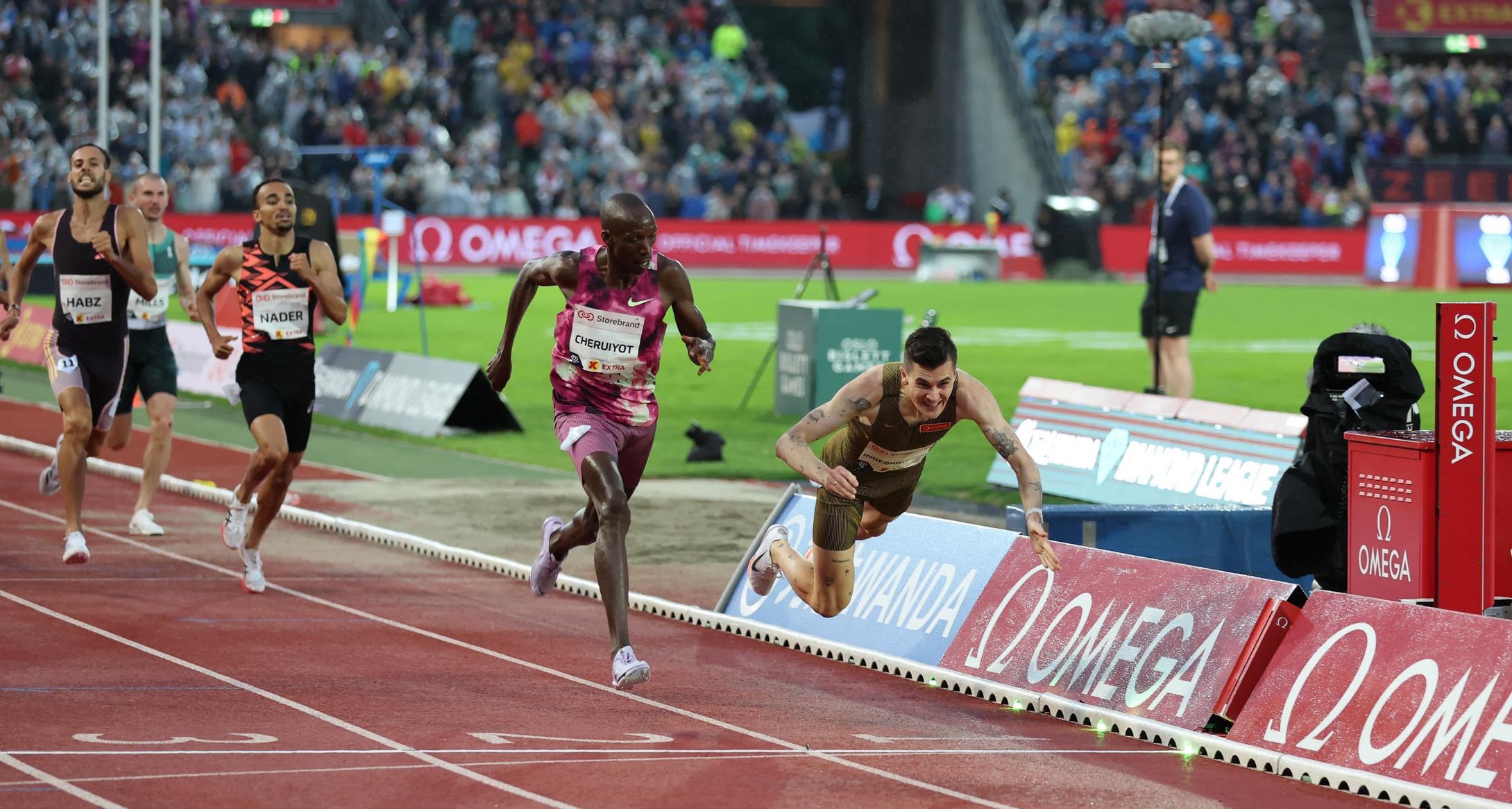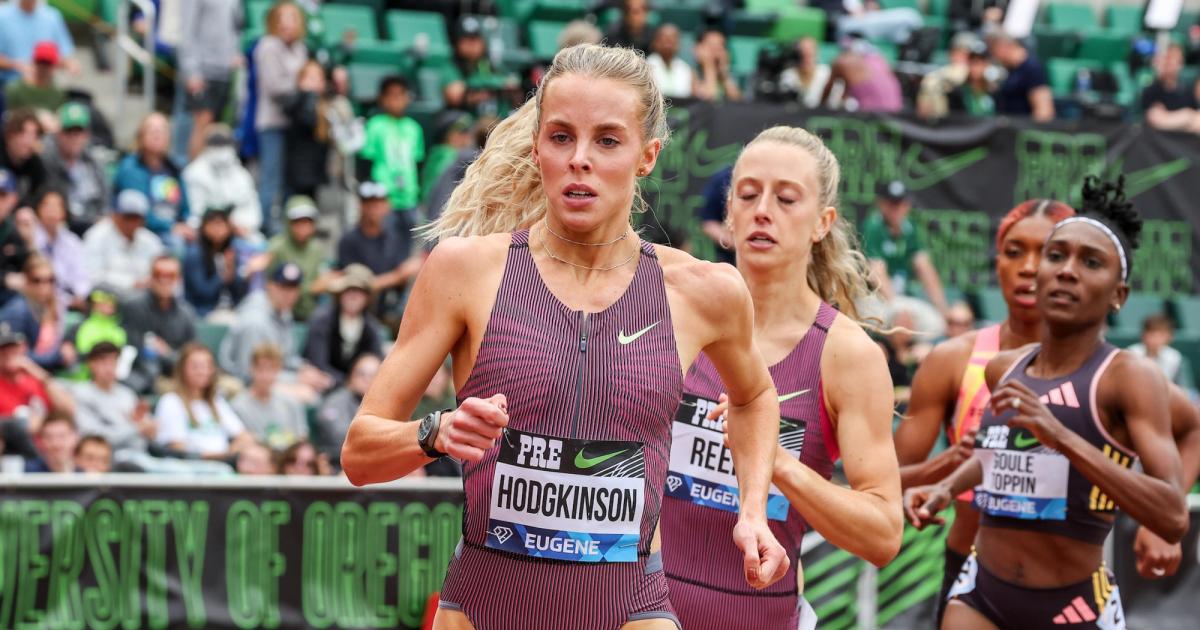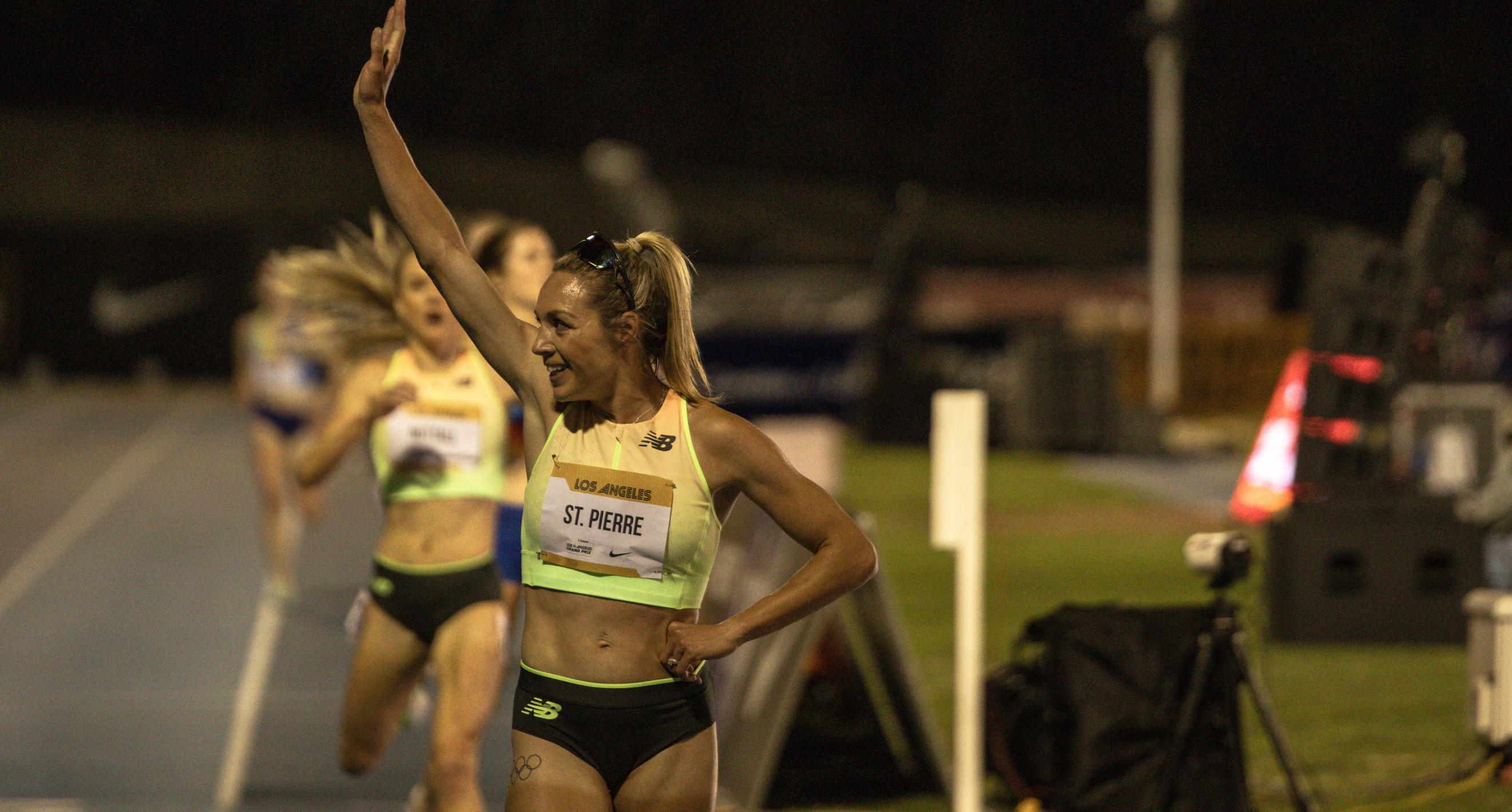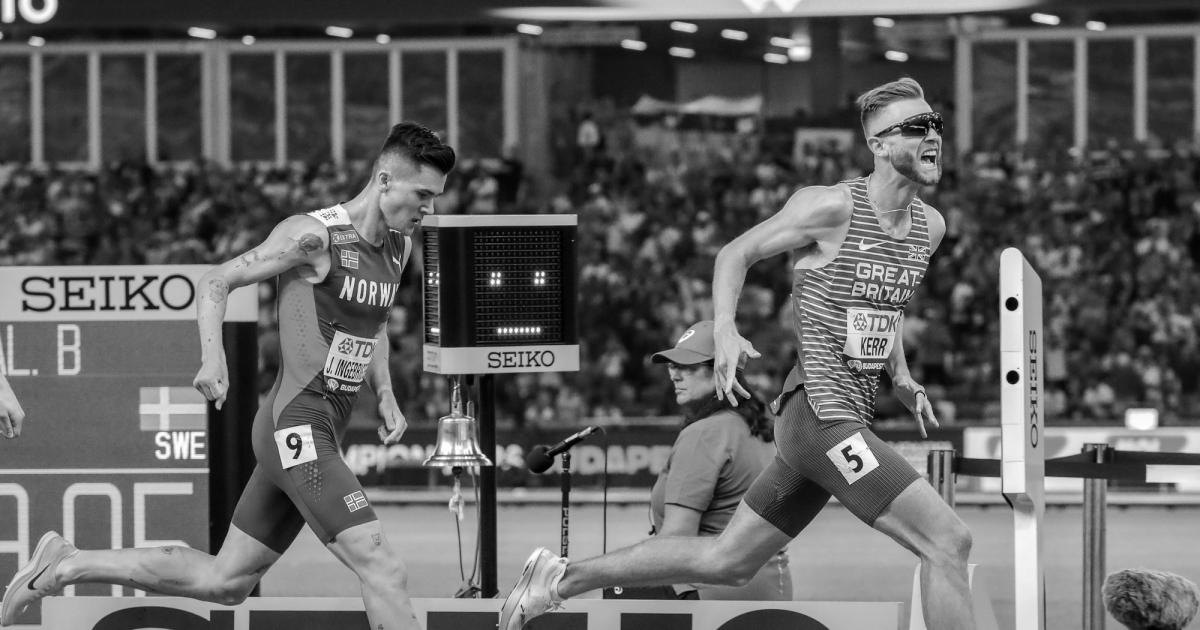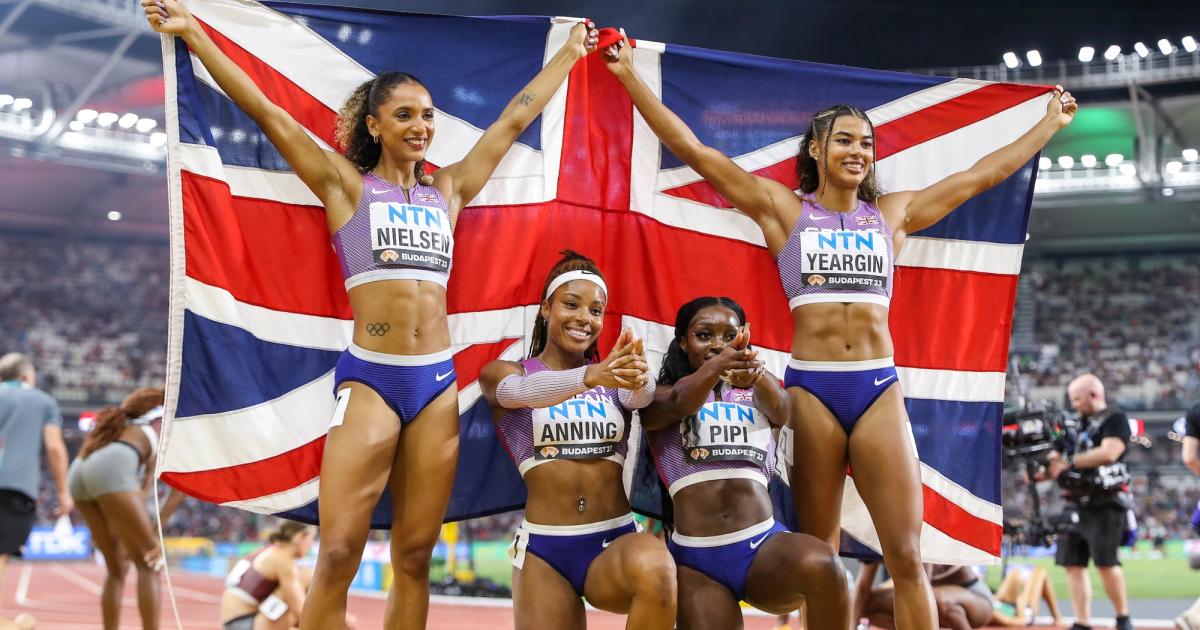By Owen Corbett
May 30, 2024
The 2024 Diamond League circuit made its first stop on its European tour on Thursday, delighting fans to some mid-week track action. Just five days after Saturday’s Prefontaine Classic which was heralded as the best track meet of the year, the Bislett Games did their best to top it. Norway’s biggest heroes faced fierce competition, we saw one of the fastest distance races in history, and a double World champion showed up in surprising form. Read below for the biggest takeaways from the action in Oslo.
Jakob Ingebrigtsen Dives For The Win
It wasn’t easy, but 2024 Jakob Ingebrigtsen (3:29.74) got in the win column. Ingebrigtsen returned to his normal tactics of leading the race once the pacers dropped off, but never opened up a commanding gap on his competitors. That led to an epic finish against an old rival.
Before there was Jakob vs. Josh, Timothy Cheruiyot (3:29.77) was Ingebrigtsen’s biggest rival on the track, and for a while it was generous to Jakob to call them rivals. Up until Ingebrigtsen took home Olympic gold in Tokyo, Cheruiyot was undefeated against the young Norwegian (10-0). The 2019 World Champion actually still holds the advantage in their all-time head-to-head record after the loss in Oslo (11-8). With the win, Ingebrigtsen avoided losing back-to-back races for the first time since a pair of Diamond League 1500m races in August of 2020, both of which came at the hands of Cheruiyot.
The dive gives Ingebrigtsen the first sub-3:30 1500m clocking in the world this year, while Cheruiyot’s runner-up finish was his fastest since this meet last year. It was the Kenyan’s second close loss on the Diamond League circuit this year, leaving him still looking for his first win since the 2021 Diamond League Final. Cheruiyot looks much more impressive early this season than he did last year when he shockingly failed to make the World final, but is still looking for his first win in any 1500m race since the Kenyan Trials for Budapest last July.
Back in eighth, Pietro Arese (3:32.13) set an Italian record and likely secured a trip to Paris with the Olympic standard. Ingebrigtsen’s fellow Norwegian Narve Nordås (3:34.86) struggled to a 13th place finish. Only Australia’s Stewy McSweyn (14th, 3:38.22) was off the pack as he may look to shift his focus to the 5000m for Paris.
Dos Santos Takes Down Warholm
Both of Norway’s biggest stars stumbled at the end of their races, but unlike Ingebrigtsen who dove for the win, Karsten Warholm (46.70) clipped the final barrier in the men’s 400m hurdles and that was all Alison Dos Santos (46.63) needed to steal the win. In the first big 400m hurdles matchup of the year, Dos Santos not only took down Warholm but he also eked under Rai Benjamin’s world lead by .01 seconds, giving him temporary top dog status in the event.
This was just Dos Santos’ second ever win over Warholm in eleven tries, with the other victory coming when the Brazilian notably won World gold in 2022. That title was sandwiched between Olympic gold by Warholm in 2021, and the Norwegian’s third World title in 2023.
This may have been the perfect appetizer to a matchup between the three titans of the event in Paris, as now “The Viking” will have a chip on his shoulder, which may be just the thing that allows him to best his own world record time from Tokyo.
On the women’s side, Jamaica’s Rushell Clayton continued her undefeated season, winning in 54.02. Unlike the men, who have been delivering season openers resembling knockout punches, the women’s 400m hurdles has been an event that takes a while to get going the past few years. In 2022, by the end of May, there were only two sub-54 clockings worldwide. By the end of the season there were 47. Last year, even without Sydney McLaughlin-Levrone contesting the event, there were 52 sub-54 performances, only six of them coming before the start of June.
Through two months of the season in 2024, we have again have six sub-54 times, and with McLaughlin-Levrone making her return on Friday night, and 2023 World champion Femke Bol (who opens her season in Stockholm on Sunday) at the top of her game, we could be on track for another banner year in the event.
Hagos Gebrhiwet Wins Historic 5000m
12:36.73.
Take a moment to digest that time. That’s what 30-year-old Hagos Gebrhiwet of Ethiopia just ran for the second fastest 5000m in history. If the time doesn’t do it for you, consider that Gebrhiwet just broke the national record of Kenenisa Bekele, who is considered by many as the greatest distance runner of all time. Bekele’s mark was due to turn 20 years old tomorrow, and stood as the world record for over 16 years.
Gebrhiwet first broke 13:00 as an 18-year-old in 2012 (setting a world junior record of 12:47.53 that has only been topped by Selemon Barega since), and has done so in eight of the past 13 years. The newly signed ASICS runner has always had fast times – this was the sixth sub-12:50 clocking of his career, tied with Bekele for the most ever – but only got his first global gold last year winning the 5k at the World Road Running Championships. Gebrhiwet, who is undefeated on the year, has a silver medal and two bronzes on the track, but all of those were between 2013-2016. Now the fastest man in the world this year, he’ll have a shot to finally earn gold on the biggest stage this summer in Paris
Behind Gebrhiwet, the race could easily be called the deepest 5000m in history with 13 men breaking 13:00, tying a record set at last year’s Florence Diamond League. 12 of those men ran the fastest time of their career (the only one who didn’t was world record holder Joshua Cheptegei who ran 12:51.94 for ninth), and six of them set national records. Those national records included American-based runners in Luis Grijalva (6th, 12:50.58) who bettered his own Guatemalan record and Adriaan Wildschutt (13th, 12:56.67) who lowered his own South African mark.
Someone who didn’t set a national record was last year’s winner Yomif Kejelcha (2nd, 12:38.85) of Ethiopia, who led the majority of the race after moving ahead of the pacers but had no response to Gebrhiwet’s 54.99 final lap. Speaking of pacers, Ethiopian Addisu Yihune (5th, 12:49.65) was listed as one, but the 21-year-old stayed in the race after Kejelcha passed him, and ran under 13:00 for the first time in his career. And he ran way under, you love to see it.
In the longest women’s race of the day, Australian Georgia Griffith (8:24.20) set an Oceanian record in the 3000m, breaking Jessica Hull’s indoor (8:24.39) and outdoor (8:31.81) marks. Hull finished third in the race (8:25.82). Griffith finished second to Hull at their national championships 1500m back in April. She is one of 5 Aussie women with the Olympic standard in the 1500m, meaning this result, in addition to her runner-up finish at nationals, will go a long way toward selection from her national federation. Griffith was a finalist in the 1500m at the 2022 World Championships, but missed the meet last year.
Men’s 400m Is Wide Open, The Women’s 400m Is Not
In the men’s 400m, Brit Matthew Hudson-Smith improved upon his own European record (44.07). Hudson-Smith won bronze at the World championships in 2022, and upgraded to silver in 2023, will he be able to take the next step to gold this summer? His time on Thursday was the second fastest time of the year behind only indoor “world record” holder Christopher Morales-Williams of Canada.
Hudson-Smith has certainly thrown his name into the bucket of contenders for Paris, but it is a crowded one that includes Morales-Williams, reigning Olympic champ Steven Gardiner, World Indoor champ Alexander Doom, not to mention the return of 2022 World Michael Norman, and the legends Kirani James and Wayde Van Niekerk. And due to the nature of the event, there is just as good of a chance that someone I didn’t even mention has gold around their neck come August.
Americans Vernon Norwood (3rd, 44.68) and Quincy Hall (5th, 45.02) both recorded their best time of the season so far.
On the women’s side, there was more dominance from 2023 World champion Marileidy Paulino. The Dominican Republic runner ran her first sub-50 of the year (49.30), marking her fastest time since she won her World title in Budapest. Her time was the fastest in the world outdoors this year, and continued her undefeated season. Paulino has won nine 400m races in a row since last July, and her win in Oslo marked the lucky 13th Diamond League victory of her career. As for her competition, only Poland’s Natalia Kaczmarek (49.80) was within a second of her in Oslo. While it won’t be a cake walk this summer for the reigning Olympic silver medalist, there is no clear challenger to her crown, especially with McLaughlin-Levrone returning to the hurdles.
Back in sixth, Norway’s Henriette Jæger (50.81) lowered her own national record in front of a home crowd, becoming the first woman in the nation’s history to break 51 seconds in the 400m.
Shericka Jackson Has Some Work To Do
Yikes. Before today, Shericka Jackson had not lost a meaningful 200m race in her last 15 tries, dating back to her 2022 season opener (and even in that race she ran 22.07 behind American rival Gabby Thomas). Jackson had not finished outside the top three in a 200m race since her prelim debacle in Tokyo. On Thursday in Oslo, the second fastest woman in history finished fifth (22.97), her lowest in a 200m race since 2018, back when she was still more of a 400m specialist.
Jackson never looked like herself during the race. She came off the turn behind the leaders and only faded further down the stretch. American Brittany Brown (22.32) had a strong final 50m to take the win from veteran Marie-Josée Ta Lou-Smith (22.36). Brit Daryll Neita finished third (22.50), but finished faster than both of her Diamond League wins earlier this season.
Jamaican sprint fans have reason to be worried right now with Jackson far from top form and double-double Olympic champion Elaine Thompson-Herah opening her season over the weekend with a last place finish in the 100m at the Prefontaine Classic. Those from the island are likely hoping the season opener of Shelly-Ann Fraser-Pryce will put them at ease… whenever that may be.
Five More Takeaways
– South Africa’s Akani Simbine (9.94) took home the win in the men’s 100m, continuing his undefeated season. The 30-year-old sprinter has won four straight finals to start the year, which matches the stretch of success he had leading into last year’s World Championships before he was disqualified for a false start in the semifinals. Simbine has never won a global medal, but is an early favorite to do so this year, he holds the unofficial world lead of 9.90
– In the men’s discus, despite passing on his final throw, world record holder Mykolas Alekna (70.91m) of Lithuania continued his undefeated season. It is the third competition of the year in which Alekna has thrown over 70m, something the rest of the world has combined to do just twice so far. Alekna had just one big throw on the day in the second round, but it was more than enough as he won by over ten feet. On the women’s side, China’s Feng Bin (67.89m) won with her furthest throw of the year. The 2022 World champion has only lost to Valarie Allman and Yaimé Pérez this year, the two throwers that occupy the top six spots on the world leaderboard.
– In the women’s 800m, South Africa’s Prudence Sekgodiso (1:58.66) backed up her breakout win from two weeks ago and leads the Diamond League standings in the event through the end of May.
– The men’s pole vault was won by American record holder KC Lightfoot (5.82). Lightfoot failed three attempts at 5.90m as no one in the world seems to be able to get close to the numbers that world record holder Mondo Duplantis is putting up. The outdoor season of two time World medalist Chris Nilsen (5.62m) continues to be a struggle as he finished seventh. Nilsen has not finished top three in any of his last five competitions.
– The men’s triple jump was won by reigning World champion Hugues Fabrice Zango (17.27m) of Burkina Faso. His fourth round mark survived an impressive final jump from Algeria’s Yasser Mohammed Triki (17.25m) who finished second.

Owen Corbett
Huge sports fan turned massive track nerd. Statistics major looking to work in sports research. University of Connecticut club runner (faster than Chris Chavez but slower than Kyle Merber).
